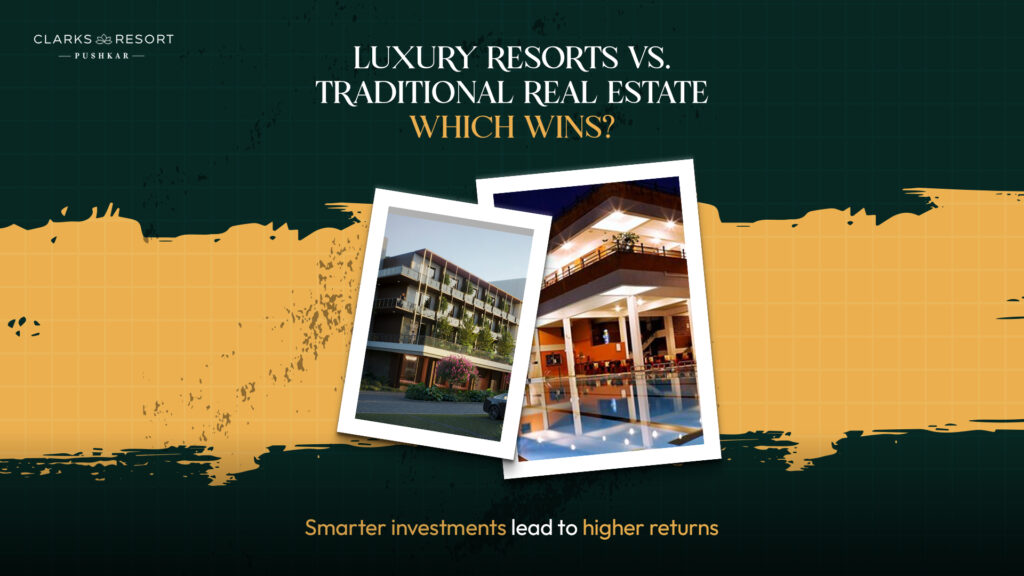The real estate industry, a crucial contributor to India’s economy, encompasses a diverse spectrum of properties catering to a range of budgets and preferences. In this vast landscape, regular real estate and luxury real estate stand as two different realms. Each of these encapsulates a unique set of aspirations, economic dynamics, and features. The increasing number of investors seeking higher returns than they can get through conventional investment channels are turning to the hospitality industry to maximise their gains. While exploring the investment opportunities in hospitality real estate, the hospitality industry seems divided into two verticals- traditional real estate and luxury hospitality. The major concern of many investors is ‘which offers better return’. If you, too, are planning to invest in the hospitality industry but are in a dilemma about deciding with confidence, this blog may help you invest right.
Distinction Between Traditional Real Estate & Luxury Hospitality Real Estate
What defines luxury hospitality real estate? How is it different from traditional real estate? There is no universally agreed-upon threshold. However, luxury hospitality typically represents the upper echelon of the real estate market, characterized by exclusivity, opulence, and premium amenities. Luxury resorts with sprawling landscapes, boasting architectural grandeur, and offering world-class amenities are emblematic of luxury real estate. Economic bubbles influence the demand for luxury properties but for a short time as these are subsidised soon by the financial stability of high-net-worth individuals. The luxury hospitality market has become a global playground for investors seeking safe and diversification opportunities. Major states across continents, especially Rajasthan, have emerged as epicentres of luxury resorts, attracting a cosmopolitan clientele.
Traditional real estate encompasses a range of property types, sizes, and price points. Residential homes, commercial spaces, and industrial plots are the major constituents of traditional real estate. The properties under this segment cater to the diverse needs of a comparatively larger segment of end-users. The traditional real estate market is more sensitive to economic fluctuations and demographic trends. The traditional real estate hinges on local dynamics responding fast to the prevailing economic conditions and the changing aspirations of the local investors.
Various investment modes, including real estate, offer distinct characteristics, risks, and scope for returns. A brief comparison of returns through different asset classes is given below:
Comparing Returns: Traditional Real Estate Vs. Luxury Resorts
Rental Income in Luxury Real Estate: High-end residences, typically in popular tourist destinations like in Rajasthan, fetch higher rental rates. Compared to long-term leases, short-term rental schemes deliver higher profits. The rental returns may vary from 4% to 8% per year. However, if managed effectively across many platforms, the profits can reach even greater levels. Rental income in traditional real estate is found to be around 3% to 7%, the variation depends on the demand and location of the property. Long-term leases provide stability but are not effective in achieving short-term income goals.
The hospitality industry in India is experiencing exponential growth, especially in the luxury resort sector. India’s tourism industry is flourishing, particularly in picturesque, religious, and cultural destinations like Pushkar, Rajasthan. At such locations, there’s an increasing demand for top-tier resorts offering exceptional returns to investors. On the other side, traditional investment avenues offer better liquidity and simpler diversification. Traditional investment plans can be implemented with less capital in hand.
The growth of the luxury hospitality industry is driven by broad economic patterns like interest rates, wealth distribution, and government policies. Premium properties, being developed at internationally famous mainstream areas, have a trend of reflecting steady value growth over time. The stocks of traditional real estate investment can offer quick growth, while the bonds provide returns at lower rates.
The selection between traditional and luxury resort investment opportunities depends upon personal financial aims, risk appetite, and long-term planning. For investors aiming to have a stable income source, long-term appreciation, and tangible asset ownership, investment in luxury real estate is a great choice.
Luxury Resorts Investment: A Promising Choice for Real Estate Investment in 2025
The luxury resort market in India is experiencing significant growth, driven by increasing demand for wellness tourism, a rise in international tourism, and the growing affluent Indian population. “The luxury resort market is expected to grow at a CAGR of around 8.92% to reach a value of over US$ 51 billion by 2029”- India Luxury Hotel Market Analysis and Forecast (2023-2029). The rising tourism and travel business are the key contributors to the growth in the market profits of luxury resorts. The growing standard of living of individuals, increase in preference for leisure tourism, and growing disposable income is expected to keep market development at a fast pace. With increasing preference for leisure tourism, there is a steady rise in demand for holiday resorts particularly designed to support visitors to relax and take a break from busy daily schedules.
Top Ten Key Benefits of Investing in Luxury Resorts
- Luxury resorts yield higher rental returns than standard properties, making them a lucrative investment choice.
- Luxury resorts consistently outperform traditional real estate investments.
- Investors get high returns from the properties that align with green tourism trends.
- Resort homes offer excellent occupancy rates compared to regular properties.
- Vacation rental properties, when well-managed and located in ideal tourist locations, get a high appreciation of capital.
- Investing in resorts can offer multiple tax benefits.
- Investment in luxury resorts managed by premium brands like ‘The Clarks Resorts’ provides hassle-free ownership. The resort staff takes care of maintenance and property management.
- Investing in a top-branded luxury resort is not just about making money to get profit, but it’s also about making lifelong memories. As an owner of private space, you are privileged to access several features like spas, fitness centers, swimming pools, and entertainment options.
- Traditional real estate investments may lose purchasing value because of inflation, but luxury resort properties are material possessions. Investment in luxury resorts tends to increase in value even during inflationary times.
- Investment in a luxury resort is a risk-free investment approach to build legacy assets where your families can make priceless memories and enjoy vacationing together.
Investing in Clarks Resort Pushkar, A Rajasthan-Based Luxury Resort: A Never Before Investment Opportunity Founded in 1947, The Clarks Group of Hotels is known for setting new benchmarks in hospitality excellence. Having over 145+ properties across India and beyond, The Clarks Group offers Clarks Resort Pushkar under the umbrella of the prestigious brand The Clarks Hotels and Resorts. Clarks Resort Pushkar offers a unique investment opportunity for investors looking for something extraordinary. Own a private villa at Clarks Resort Pushkar. Enjoy the growth of your investment with assured returns and numerous privileges, making you feel elite. For long-term assured returns with high potential for increase, you can rely on ‘The Clarks’. To book your appraisal with the customer support team, call 9257797775.



